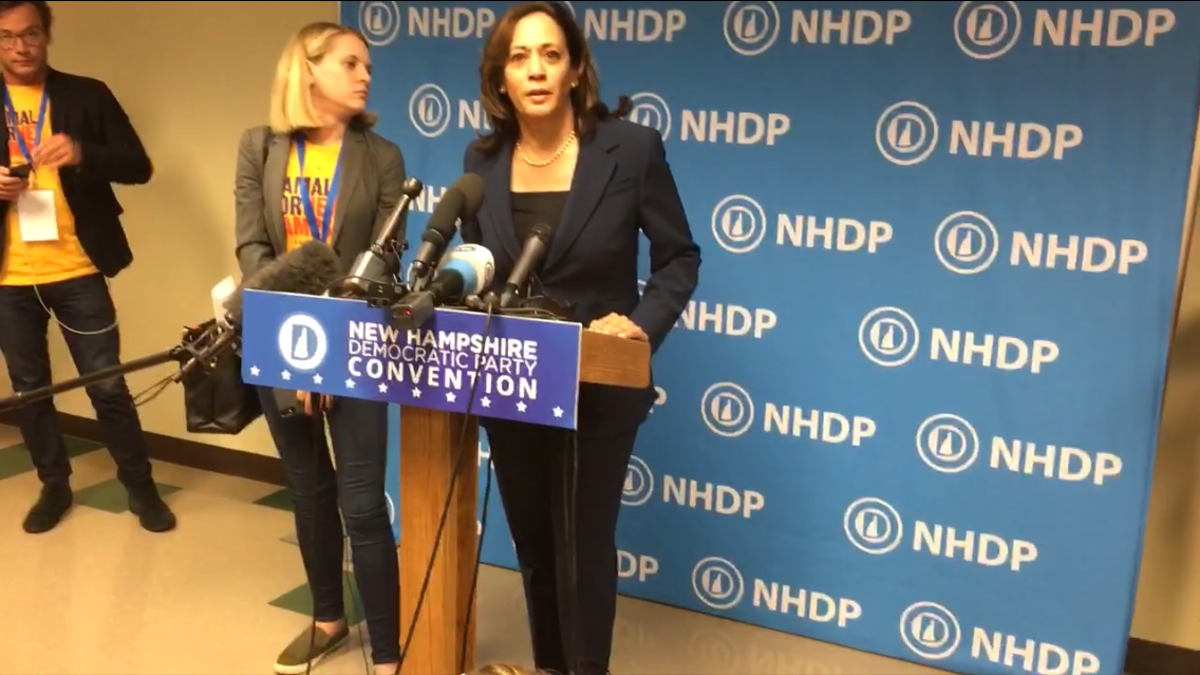Fox News Flash top headlines for June 1
Fox News Flash top headlines are here. Check out what's clicking on Foxnews.com.
Longtime New Hampshire Secretary of State Bill Gardner has been defending his state’s century-old tradition of holding the first primary in the presidential nominating process for over four decades – and with a new threat from Nevada looming, it looks like Gardner will once again have to fight to keep his state’s first-in-the-nation position.
Nevada’s state Senate passed a bill on Monday that would transform the state’s presidential caucus into a primary and move the contest to the lead-off position in the race for the White House.
Nevada is currently third in the Democrats' nominating calendar, trailing Iowas’ caucuses and New Hampshire’s primary. It’s fourth in the Republican schedule, trailing Iowa, New Hampshire, as well as South Carolina’s primary.
SOME DEMOCRATS TRYING TO STOP IOWA, NEW HAMPSHIRE, FROM KICKING OFF PRESIDENTIAL NOMINATING CALENDAR
The bill, which passed the Nevada Assembly last week, still needs the signature of Democratic Gov. Steve Sisolak, who’s not said if he’ll sign the legislation but who’s been supportive of the idea. And it would need the backing of the national parties – the Democratic National Committee (DNC) and the Republican National Committee (RNC).

A Biden-Harris supporter carries flags while riding in the back of a limousine in Las Vegas, in this November 2020 file image. Nevada lawmakers have passed a bill aiming to make the state the first to weigh in on the 2024 presidential primary contests. (AP Photo/Jae C. Hong, File)
The measure – AB126 – would move Nevada’s contest to the first Tuesday in February in presidential nominating years, likely leapfrogging Nevada ahead of Iowa and New Hampshire.
If it ever came to fruition, the Nevada bill would likely force Gardner to move the date of the New Hampshire presidential primary up in the calendar. As dictated by state law, New Hampshire must hold its primary "7 days or more immediately preceding the date on which any other state shall hold a similar election."
"Our law hasn’t changed," Gardner told Fox News on Tuesday. "I’ll follow the law like I always have – like the oath of office I take says."
EARLY STATE GOP CHAIRS TEAM UP TO PROTECT THEIR PRESIDENTIAL PRIMARY TURF
The push for the Silver State bill comes after former longtime Sen. Harry Reid of Nevada, who served for eight years as Senate majority leader, starting making waves in December as he urged that his home state jump to the start of the nominating calendar.
Reid, who remains very influential in the national Democratic Party, was instrumental in moving Nevada’s caucuses in 2008 from an afterthought to third position in the Democratic presidential nominating calendar.

A sign by New Hampshire's state capital building marking the state's century-old tradition of holding the first presidential primary in the race for the White House, in Concord, N.H.
The knock against Iowa and New Hampshire – among some Democrats – for years has been that the states are too White, lack any major urban areas, and aren’t representative of a Democratic Party that’s become increasingly diverse over the past several decades. Nevada and South Carolina are much more diverse and have larger metropolitan areas than either Iowa or New Hampshire.
"It’s time for Nevada to take its rightful place, not just first in the West but in the nation, as a diverse state, a state with diverse issues," Nevada Assembly Speaker Jason Frierson, a Democrat who sponsored the legislation, said last week.
EARLY MOVES ALREADY UNDERWAY IN THE 2024 WHITE HOUSE RACE
While there’s been talk behind the scenes by Democratic Party officials and leaders to reorder their primary process, there’s been virtually no support by national Republicans to do likewise. Nevada Republican Party chairman Michael McDonald opposes the change. He’s warned that a unilateral move by Nevada could trigger sanctions that would penalize the Silver State and reduce its influence on the presidential nominating process.
RNC chair Ronna McDaniel told Fox News in January that she didn’t "foresee changes" in the current Republican nominating calendar. But she added "that’s a little too far down the road " and that she was "not going to get ahead of the committee" in making any news.
New Hampshire GOP chair Steve Stepanek told Fox News that during the RNC spring meeting in Dallas in April, "everybody was very supportive" of the current calendar and "we haven’t heard of any rumblings, rumors or anything of anyone else challenging that."
The DNC’s still reviewing the reforms they made in their 2020 calendar, and it’s unlikely they’ll start weighing in on the 2024 process until later this year or next year.
The national party’s new chair, South Carolina’s Jaime Harrison, said recently that "we are going to continue to let the process play out, as it does every four years, and look forward to hearing the insight and recommendations from all interested parties on the 2020 reforms, and on the 2024 calendar at the appropriate time in the process."
The DNC's final decision may also be influenced by President Biden, the leader of the party. During the 2020 Democratic primaries, Biden came in a disappointing fourth in Iowa and fifth in New Hampshire before rebounding with a second-place finish in Nevada’s caucuses and a landslide victory in South Carolina’s primary.
Biden has yet to weigh in on the subject.

Democratic presidential candidate Sen. Kamala Harris of California, at the New Hampshire Democratic Party convention, in Manchester, NH on Sept. 7, 2019
Vice President Kamala Harris, who during her unsuccessful bid for the 2020 presidential nomination faced some criticism for not spending much time campaigning in New Hampshire, was asked during an April stop in the state if the Granite state should continue to hold the first primary.
"I think New Hampshire is a very important state for many reasons," the vice president said with a slight dodge of the question.
CLICK HERE TO GET THE FOX NEWS APP
Longtime New Hampshire Democratic Party chair Ray Buckley told Fox News last week that "we take all challenges to the primary seriously. We have successfully defended the primary for decades and believe that we have a strong argument for New Hampshire to retain its place."
Buckley highlighted that "the level of engagement involved in the electorate here is significantly different than anywhere else, and I think that is one of the arguments why New Hampshire should remain first."
And Iowa Democrats chair Ross Wilburn told Fox News in a statement that "Iowa going first does not take away from other state’s abilities to hold primaries, it adds to the conversation."
And he emphasized that "Iowa also provides the perfect grassroots opportunity for candidates who don’t have the name recognition or funding to break through in larger states. We are working hard to ensure Iowa continues to have a crucial voice in the Presidential nominating process."












































